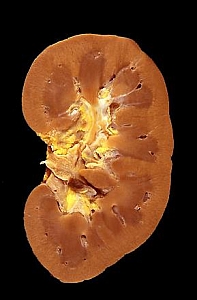21 July 2014. Regulus Therapeutics Inc. in San Diego says the U.S. Food and Drug Administration designated its RNA therapy for Alport syndrome, a rare genetic kidney disease, an orphan drug. The therapy, code-named RG-012, shows promise in preclinical studies, including with lab mice.
Alport syndrome affects about 1 in 50,000 newborns, a condition that results in progressive loss of kidney function. The disease is caused by mutations in three genes that provide instructions for making a protein used by specialized blood vessels in the kidneys to remove water and waste from the blood, and create urine.
The mutations prevent the kidneys from performing these functions, leading to fibrosis and scarring of the kidney and eventually kidney failure. People with Alport syndrome also experience vision and hearing loss, since that same protein affected by the mutations is also a key component in the development of inner ear structure, as well as shape and color of the retina.
Regulus develops therapies based on micro-RNAs, molecules of genetic material based on a person’s DNA that regulate genes’ expression of proteins in the body. One micro-RNA can regulate entire collections of genes and are thus considered important regulators of the human genome.
Research by Regulus shows one micro-RNA, miR-21, to be over-expressed in mice with Alport syndrome. RG-012 is a chemically-modified genetic molecule that inhibits the functioning of miR-21 in lab cultures. Regulus says tests in mice with Alport syndrome show RG-012 decreases the rate of kidney fibrosis, and increases the life span of mice by 50 percent. The company is aiming for the first half of 2015 to begin a clinical trial of RG-012 as a treatment for Alport syndrome.
Orphan drug designation is granted to treatments being developed for diseases affecting fewer than 200,000 people in the U.S. Therapies, both drugs and biologics, designated as orphan drugs qualify for incentives such as tax credits for clinical trials and exemptions from marketing application fees.
Regulus was formed in 2007 as a joint venture of Alnylam Pharmaceuticals and Isis Pharmaceuticals to develop micro-RNA therapies. The company is also developing a micro-RNA treatment for hepatitis C viral infections.
Read more:
- Personal Leukemia Immunotherapy Given Breakthrough Status
- FDA Grants Experimental Leukemia Drug Orphan Status
- Engineered Antibody Given FDA Breakthrough Tag for Myeloma
- FDA Fast-Tracks Depression Drug from Northwestern Spin-Off
- FDA Speeds Lymph Node Detector Review for Head/Neck Cancer
* * *


 RSS - Posts
RSS - Posts
You must be logged in to post a comment.